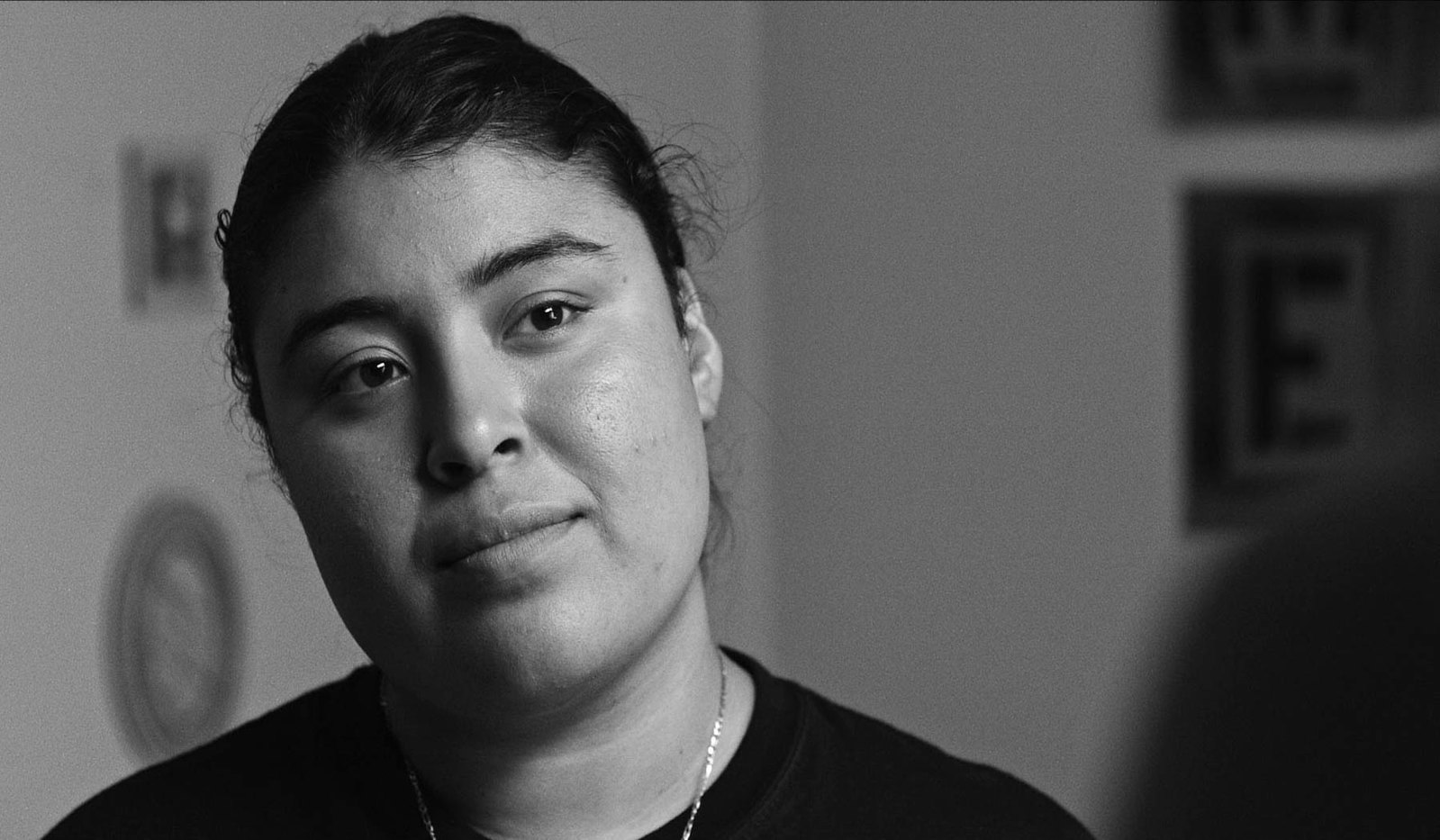Raised in Compton by a mother from Jalisco and a dad from Nayarit, Mexican-American first-time actress Monica Betancourt never imagined a possible career path for herself as an actress. But that changed when she was cast as the lead role in La Leyenda Negra, an immigration drama from Portuguese director Patricia Vidal Delgado shot in black-and-white. In the film, which premiered at the Sundance Film Festival last month, Betancourt plays Aleteia, a radically outspoken, queer, undocumented, Salvadoran teenager who is part of an underground political organization.
“I never pictured myself acting, being in a film, being at Sundance. This, for me, was a big step. And all my family is so proud of me. For us this is something really big,” she shares with Remezcla in Park City days after her movie premiered. Growing up, she was fully aware that careers in Hollywood were farfetched for aspiring artists with her background.
“We are used to having doors shut in our face and not getting opportunities. Sometimes we don’t even have people that believe we can do it. That’s why we stay closed off in our minds,” she explains. “Acting is just so big, and having one foot in now, I don’t want to take it back out. So if I get more opportunities, I’m going to keep going.”

At 19 years old, Betancourt was a senior at Compton High School taking a television production class with teacher and actor Juan Gabriel Reynoso, who appears as her stepfather in the movie, when Vidal Delgado was looking for young people to star in her debut feature. “I was looking for someone who despite her youth had the strength of a mature woman,” Vidal Delgado adds about what she saw in her young actress.
All of the other major teen cast members in the film came from the same class, which teaches students how to film the school’s sports games and do audio for the auditorium. For Betancourt, the movie — which features locations in South Central, Long Beach, and Downey — spotlights a side of Los Angeles rarely represented on the big screen. “The film is showing a piece of us, because we are from there. We are from the hood,” she notes.
Betancourt’s most difficult moments on set came when she tried to utter words that were not part of her everyday vocabulary, but that were meant to feel natural for her character. In hindsight, she laughs at this being her biggest acting challenge. “It was a little stressful that I couldn’t pronounce some words in English because of my accent, like ‘advanced parole’ or ‘self-obsessed.’ My God, we went days of me just rehearsing the word until I got it right,” she candidly remembers.

“When we heard Diego Luna was going to be the first Mexican in a Star Wars movie, it was a very proud moment for most Latinos”
Pondering how diversity on screen has evolved over the last decade, Betancourt recalls being inspired by a famous Mexican actor who carried his accent to a galaxy far, far away. “When we heard Diego Luna was going to be the first Mexican in a Star Wars movie, it was a very proud moment for most Latinos. For us to have our first Latino in this franchise in our lifetime was incredible.”
Born in Sacramento to immigrant parents, Betancourt learned early on to fear the system that threatens to separate families — a key issue La leyenda negra tackles head-on. Nevertheless, the film opened her eyes even more about that unfortunate reality. Unfamiliar with the specifics of Temporary Protected Status (TPS) and the Trump administration’s move to end it, Betancourt dedicated time to learn about the subject, not only through research, but also from anecdotal accounts of those around her who were directly impacted by these pervasive anti-immigrant policies. “Some friends who are undocumented came to me to speak about what they’d been experiencing, but others didn’t like to talk about it, so I would respect that.”
10 out of six countries included in the program until now are having their status revoked. The largest number of people affected within the 417,000 TPS-eligible immigrants currently in the United States come from El Salvador. Betancourt’s character in La Leyenda Negra, Aleteia, confronts racist and imperialist sentiments with determination, willing to risk her own freedom for the greater good. While Betancourt is personally more reserved, she identified with her plight. “Respeta mi existentcia o espera resistencia” (Respect my existence or expect resistance), a slogan often used by marginalized groups in protests, became a mantra for both the actress and her fictional alter ego.
“If you don’t want to acknowledge me, I’m going to make you acknowledge me. I’m here and I’m a human being. That’s what I felt throughout the film,” Betancourt adds. “Knowing that you are not alone and that what’s going on is being acknowledged is important.”

La leyenda negra premiered at the 2020 Sundance Film Festival.







